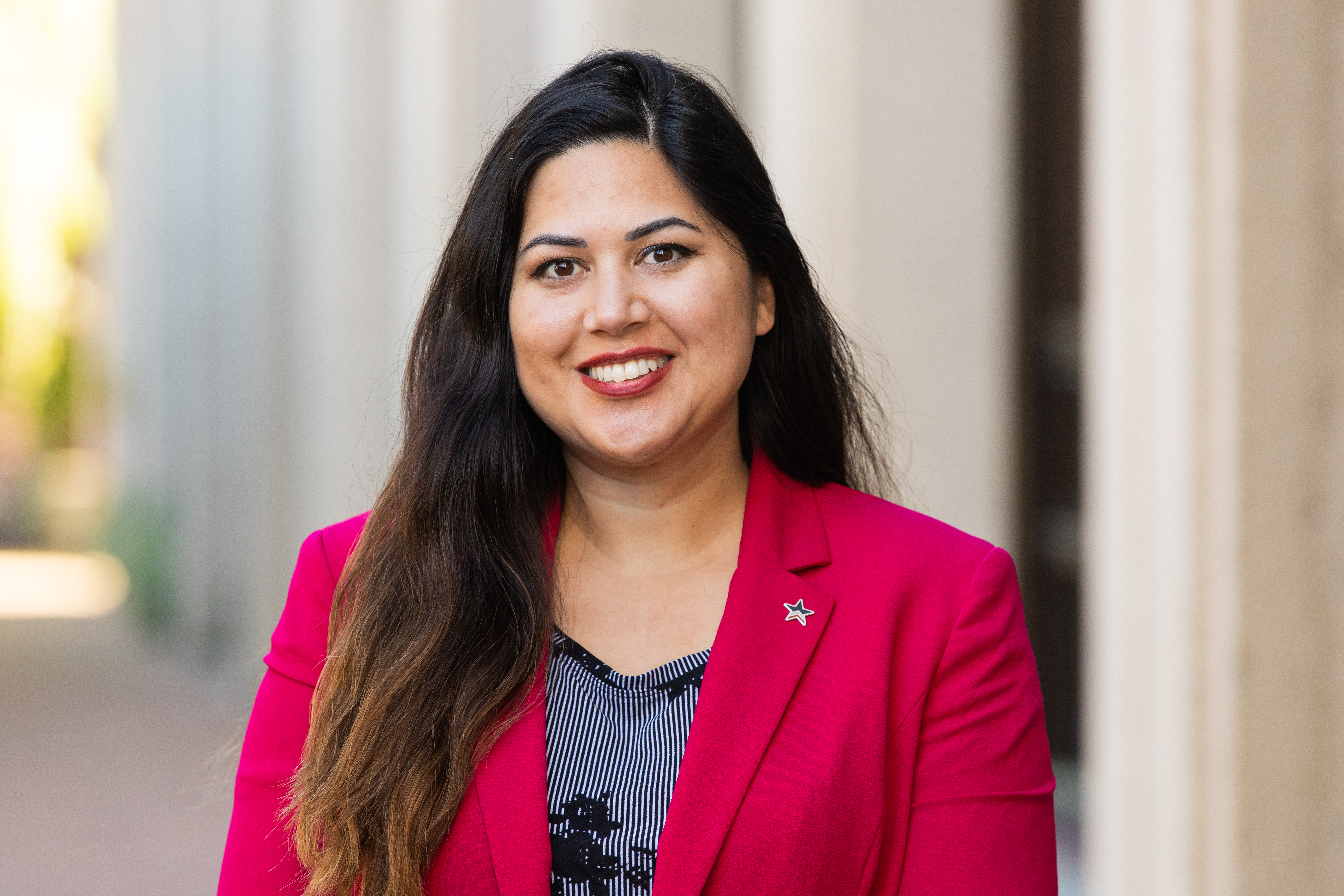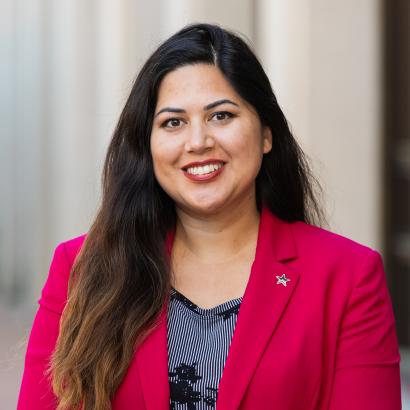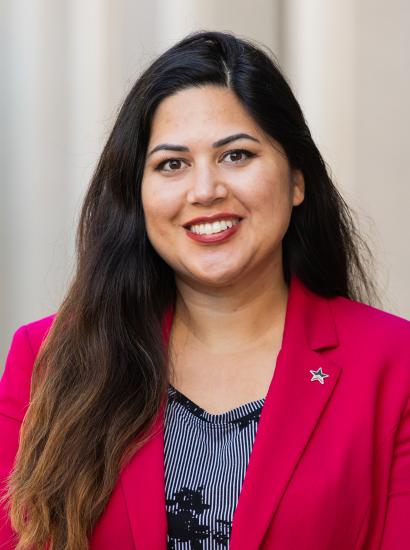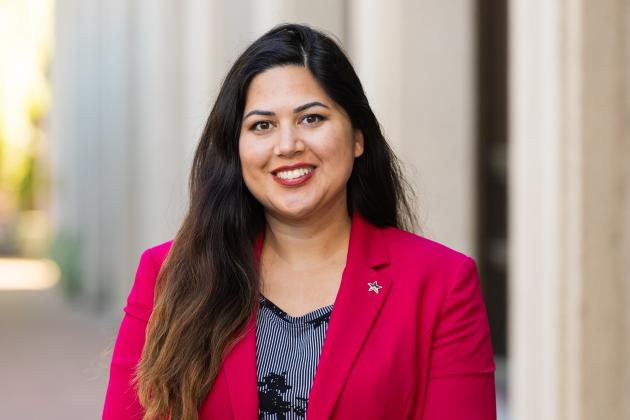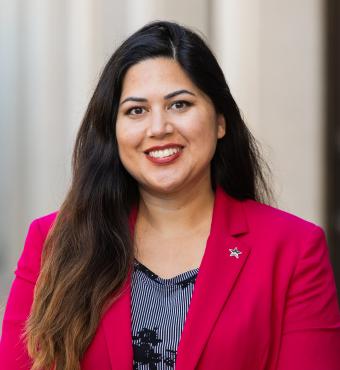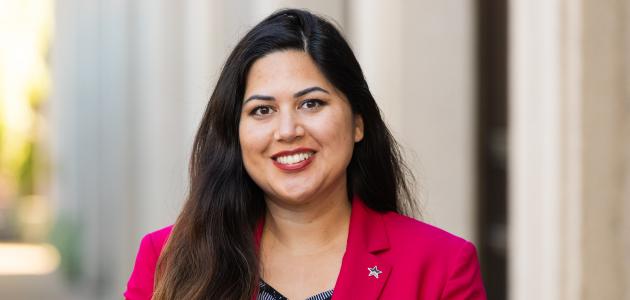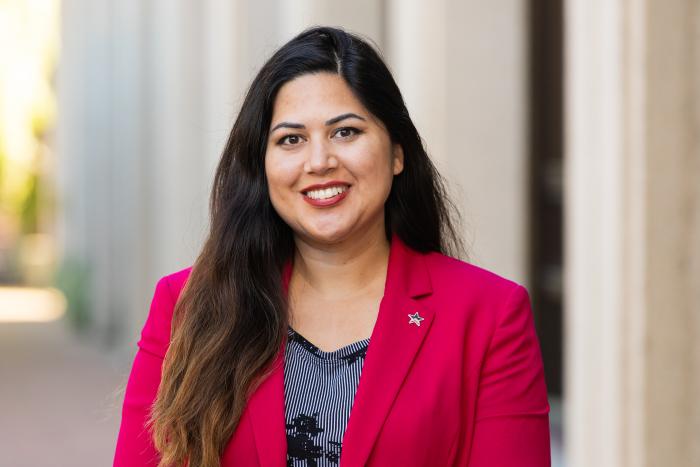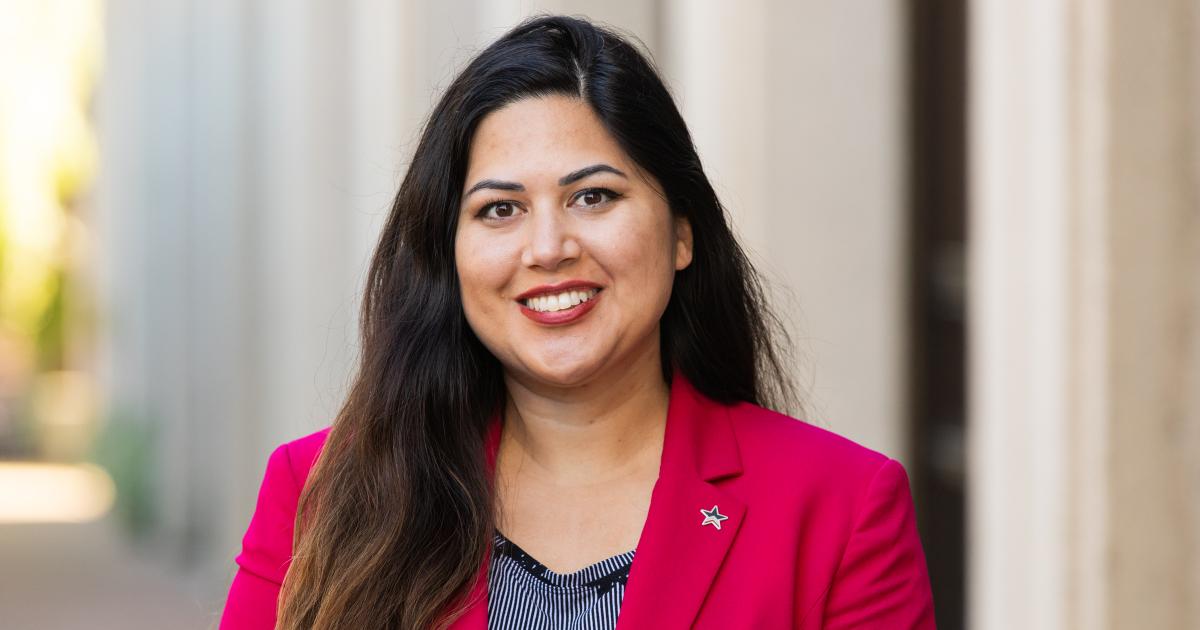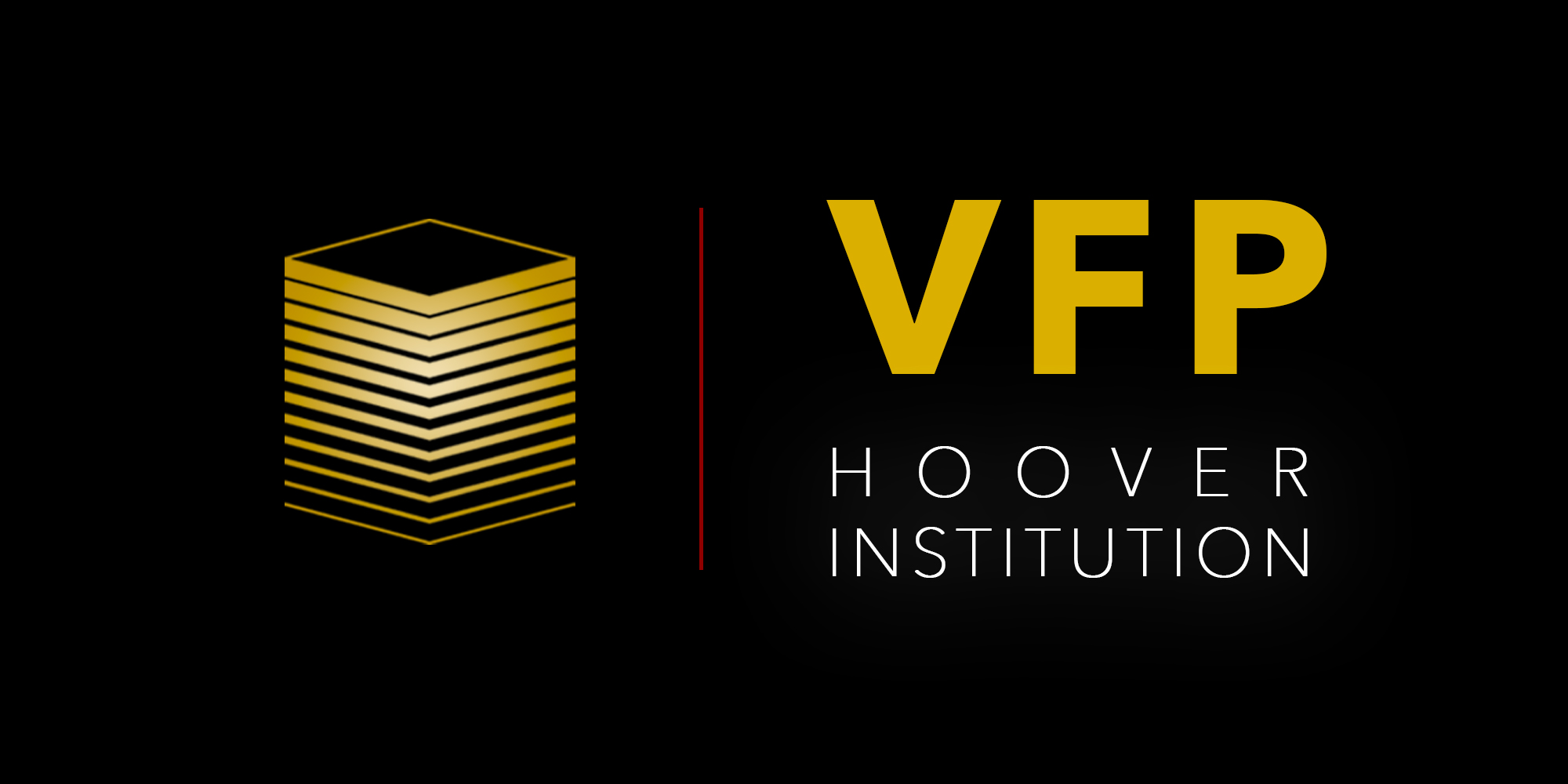Mary Kate Soliva was a part of the first-ever cohort of Hoover’s Veteran Fellowship Program, from 2021–22. She spoke to Chris Herhalt about what that year meant to her, being the only enlisted veteran to enter the program that year, hailing from the small but very important overseas US territory of Guam. Apply to join the 2025-2026 cohort of Hoover’s Veteran Fellowship Program here.
Chris Herhalt: Mary, thank you so much for taking some time to speak with me. I want to start out by asking you what motivated you to apply to the Hoover Veteran Fellowship Program?
Mary Kate Soliva: I first heard about the Hoover Veteran Fellowship Program on LinkedIn. There was another veteran who posted about it, and I was part of the inaugural cohort. So, unlike many other long-existing fellowships, there wasn’t anybody that I could speak to who had already been in the program.
But what I thought was interesting was the opportunity to work with somebody that’s so well known, like Condoleezza Rice. And big names like General (H.R.) McMaster, Admiral Roughead, and some of the senior fellows at Hoover who are very well known. Even for someone like me on the enlisted side and whose family is from Guam, I still knew who those people were.
So, the opportunity to be in a fellowship program, to have the opportunity to be mentored by these incredible people sounded so great to me, and I didn’t want to miss that opportunity. I found out about the program later in the application cycle.
So, I applied late. But I was grateful that I got my application submitted in time.
My project area focus was focusing on human trafficking from a national security perspective. I initially went into the program wanting to look at traffickers targeting to operate illicit massage businesses outside of US military installations. But once I was in the program, I pivoted a little bit to focus solely on Guam.
Chris Herhalt: Okay. So how did your time at Hoover shape your thinking or approach to leadership and policy?
Mary Kate Soliva: Hoover significantly shaped my way of thinking.
I came into the program very timid and almost like a wallflower. Being able to work, see, and meet someone such as Condoleezza Rice, to meet someone like Admiral Roughead or H.R. McMaster and Niall Ferguson, and to have them ask me for my opinion was something that I never thought would happen in a million years. But I quickly realized that I wasn’t just representing myself anymore. I became a mouthpiece for other experts in the field and for the community who have devoted their lives to this particular topic. I got my foot in the door to look at human trafficking from a national security perspective. But then when I pivoted to Guam, there were things about Guam. For instance, Guam’s considered the gateway between China and the United States. And there were other aspects of Guam being a strategic location for the United States.
I was able to make those connections with my community back home, but also with Hoover. So as much as it was about being inspired by Hoover, it was as much of what could I bring to the table for Hoover as well.
I was able to broaden that network, something that I initially didn’t think I would be able to do. And I quickly realized, with the results of my peers, that going to Guam was the best decision. And Hoover gave me the confidence to put my best foot forward and do that.
Chris Herhalt: Okay, so can you talk to me about how the fellowship influenced your work afterwards, specifically with what you mentioned about trafficking?
Mary Kate Soliva: Yes. So, one of my peers, Donnie Hasseltine, he was letting me know that “you know, Mary Kate, you bring up Guam every five minutes.”
My family being from there, I have ties back to Guam and having the blood, I am Chamorro as well. He said, “It’s not even part of your project, but I feel like it should be.” And I realized that the reason why I didn’t pick Guam initially in my application was I thought that no one would genuinely care, because we’re so far out of sight, out of mind, a lot of times we’re not even on the map when it comes to looking at the United States.
And so, I felt like if I had just focused on Guam in my application, that I wouldn’t have stood a chance to get my foot in the door. And so, while I was in the program, I pivoted from three military installations in the United States to Guam.
And as a result, I cofounded the Guam Human Rights Initiative, where our aim is to advance human rights research impacting Guam and Micronesia. I cofounded it with one of my best friends. Her and I went to the University of Guam together in grad school, and we’ve since been in touch for the past decade or so. We decided that there was a significant lack of research on human rights issues such as human trafficking, but we didn’t want to just focus solely on human rights. We wanted to leave that narrative of national security, and being in the Hoover (Veteran) Fellowship was a great launching platform to be able to do that with so many national security experts in the arena.
And having that opportunity to get their guidance was unmatched.
Chris Herhalt: What would you say to other veterans considering this opportunity or those who want to support the program? And can you speak specifically to enlisted folks who might just be on the fence about it all?
Mary Kate Soliva: For the enlisted folks? When I applied for the program, I also had self-doubts. When I was filling out my application. I recall spending four hours to complete my two-minute video recording for the application process. And I even wondered whether it was important to mention that I’m enlisted.
When I was accepted into the inaugural cohort, I was the only enlisted person there. And in speaking with my peers, I recall some of them saying, “Mary Kate, why are you so hung up on your rank?” Because I kept saying, “I’m just a staff sergeant, I’m just enlisted. I’m not even a senior non-commissioned officer.” I didn’t go to an Ivy League school. And they said, “Why are you so hung up on that?” And I said, “You guys don’t realize the opportunity. I don’t get opportunities like this to be able to brief a two-star (general).”
And even the staff told me I needed to slow down. They said, “Mary Kate, you’ve got to remember to breathe.” Because when I would talk to these incredible mentors and these experts, I would get so nervous and try to spit out everything I could in just in a few seconds.
But being part of that program as an enlisted person, I want to say that (Hoover) brings so much to the table. They have experts, advisors, individuals that Congress has on speed dial, but what they don’t have are the enlisted, the individuals who are boots on the ground, who have recent experience being with the local populace, being with the local communities to really see the problems that are impacting the American people. And many of us that are enlisted come from communities that could really use the help, and they can speak from personal experience.
And that’s what I found, is that not only am I meeting with the experts, but the window that I opened and the path that I paved for the other enlisted in the cohorts after me were able to bring issues that they themselves have lived experience with. So, I’m a big proponent of do not self-select just because you’re enlisted. Do not self-select because you didn’t go to an Ivy League school or a service academy.
You have your own story. And no one is more of an expert than you are in the shoes that you’ve walked in. Nobody at Hoover has walked the path that you have walked. And you offer so much to the program just by bringing your story to the table.
I was so hung up on the numbers in my first presentation at Hoover. And the staff said, “Why are you so hung up on the numbers? We’ve already bought into your story. We already believe you. What you’ve said is so captivating.” And I had read a letter from a survivor of human trafficking.
That really struck a chord with me because I was so hung up on the numbers and thinking that that’s what Hoover was going to care about. My advice with the enlisted is to not focus so much on what you think Condoleezza Rice or Hoover is going to care about. Come to the table with something that you’re passionate about, a problem that you see impacting the American people. And with your story, your network, I think you’ll do very well in the program.
Chris Herhalt: I want to talk now about being ethnically Chamorro from Guam. You know, your people disproportionately contribute to the defense of this nation.
And as you said, you know, we’re not on the map. We’re overlooked. What do you want folks who support Hoover to know about the enormous contribution that you and your ancestors have made to the defense of this country? And what do you think they forget about when they think about Guam?
Mary Kate Soliva: I think one of the biggest things that people forget about Guam is that we are Americans. That despite not being able to vote for the president or have a voting seat on the Hill, we are Americans and that we have had our Chamorro brothers die in combat.
Our brothers and sisters have served. We’ve deployed to the Middle East. We’ve deployed all throughout the world, and we serve in all branches of the military. And in Guam, one third of the island is owned and operated by the US military. And I’ll give you more of a recent example that when Typhoon Mawar hit Guam, just a super typhoon just a couple years ago, it barely made headlines in the US mainland. And I know many people, if they can recollect the fires in Hawaii that happened at about the same time, and that’s really what took the headlines. But our people were without power for about a month.
If you think about Hurricane Maria with Puerto Rico. Puerto Rico’s got about three million people, but Guam only has about 160,000, give or take. But that is increasing because of the military buildup. Now, even as much as patriotic as we are, the military buildup has also created hindrances for our people, not only cultural, but also regarding our indigenous land. My family was originally from Sumay, and Sumay village is now where the US Navy naval base is sitting at, perhaps post–World War II, our people were pushed off that land so that they could build the bases. But since then, like I said, we still are very patriotic in the sense that we serve.
There are many of us who serve, but there are still challenges that we face since then. And I think all too often we’re forgotten because we’re so far out of sight, out of mind. I think Americans tend to clump the territories together when in fact we speak different languages, we have different cultures, different backgrounds.







